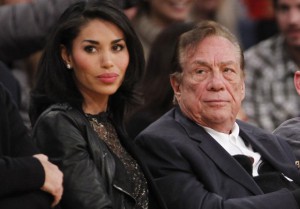How to Punish Donald Sterling without Censoring Free Speech
In the context of the Donald Sterling’s racist remarks, it is important to remember that all people have rights–even those who are bigoted and offensive. If we silence bigots, we would also be silencing political dissenters – and destroying free speech.
 Los Angeles Clipper owner Donald Sterling made racist comments about African Americans to Stiviano, his alleged girlfriend (Sterling is married to another woman). Sterling told Stiviano he didn’t want her taking pictures with Magic Johnson or see African Americans at his games. Sterling’s comments have drawn criticism, even from his own wife. The NBA have announced they are fining Sterling $2.5 million for his comments, banning him from any NBA games, and forcing him to sell the team.
Los Angeles Clipper owner Donald Sterling made racist comments about African Americans to Stiviano, his alleged girlfriend (Sterling is married to another woman). Sterling told Stiviano he didn’t want her taking pictures with Magic Johnson or see African Americans at his games. Sterling’s comments have drawn criticism, even from his own wife. The NBA have announced they are fining Sterling $2.5 million for his comments, banning him from any NBA games, and forcing him to sell the team.
There is precedent for rich people losing their property rights if they express views which are perceived as bigoted. Sports leagues have suspended owners from management for making racist comments before, like former Cincinnati Reds owner Marge Scott. Powerful figures outside sports have also lost positions of privilege because of their views. Former Mozilla CEO Brendan Eich was essentially forced to resign after the public discovered he had donated money to support California’s Proposition Eight, the initiative which would have restricted marriage in California to a man and a woman.
Public Censorship
Donald Sterling is a relic of the past–which is to say, he is an easy target to mark as bigoted. Sterling is a rich white man who allegedly discriminated against black children by denying them housing, but who is willing to profit from black labor on basketball courts. Sterling is a cranky old man who doesn’t want to be associated with black people, but who is perfectly fine with rumors that he is having an affair with a partly black woman.
But that doesn’t mean the NBA should try to discipline him. Sterling still has the right to express himself, especially in a private conversation. Sterling would hire a wall of lawyers if the NBA took any action, and that would force the courts to intervene. Let me be clear: judges cannot approve suspension of Sterling’s property rights merely because of offensive and ignorant things he said privately to his mistress.
Yes, Sterling is a noxious racist who was accused of violating the Fair Housing Act by denying black children housing. During that case though, Sterling had violated a federal statute and there was no free speech defense. In this week’s scandal, Sterling was making private comments. We cannot take away people’s rights merely because we don’t like what they say. Those comments may end up hurting the Clippers and the NBA, but a lifetime ban and a $2.5 million fine will have to suffice.
On the other hand, if the economic consequences hurt the NBA, doesn’t the NBA have the power to boot Sterling since Sterling’s behavior will in turn hurt the NBA? The same applies to Brendan Eich. If people boycotted Firefox because of Eich’s support for Proposition 8, wouldn’t Mozilla be justified in terminating a CEO who was causing them to lose business?
The difference is that the government cannot be involved in anyway. The Mozilla firing is partly justified because the board of directors could take action without any government oversight. The forced Clippers sale will result in eventual court oversight. No part of the government, including the courts, can strip Sterling of his free speech rights, no matter how repulsive he is. The NBA needs to find a way to address the scandal without the power of the government.


Comments
“Free Speech” as defined by the US Constitution covers political speech…the US govt cannot limit what you say regarding the government. IT DOES NOT COVER CALLING PEOPLE NAMES ETC.
Frankly most people in the country are NOT worried about billionaires and what they say about their wealthy employees.
Surprised a legal site does not know this.
Hi Phil,
Thanks for your response. It is true that the primary function of the 1st amendment is to protect political speech which criticizes the government, but the 1st amendment is more expansive than that. Free speech protects our right to express ourselves. Free speech means that we won’t have any kind of thought police governing our private conversations.
In essence, free speech means that even name calling is protected. There are exceptions. Name calling cannot be slanderous or provoke violence. The Supreme Court has protected the KKK, who say much worse things than Mr. Sterling. The Supreme Court has overturned hate speech statutes, which punish name calling far worse than anything Mr. Sterling said during a private conversation.
I know that what Donald Sterling said was offensive and that it is outrageous that his words should be legally protected. The question is not whether my knowledge or this website’s knowledge is adequate, but whether we should protect minority rights. Yes, Mr. Sterling is a minority. He is one hateful old man from a bygone era. But that doesn’t mean he should be punished for something he said in a private conversation. The Constitution should protect him, and everyone else, from that type of public grandstanding.